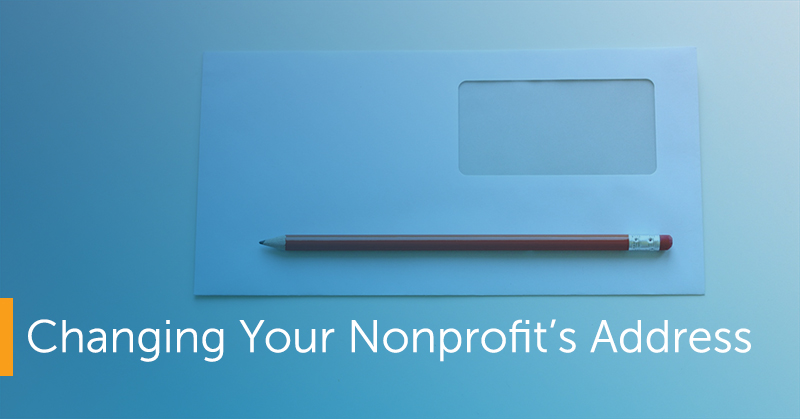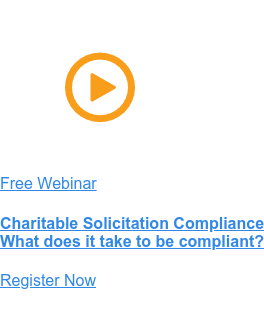-
Software
Compliance Software
Businesses and nonprofits can oversee licenses, track renewals, access documents, and more from a single interface.
Software OverviewSoftware Features -
Services
Compliance Services
Full service compliance solutions for organizations throughout their entire lifecycles.
Business Overview Nonprofit Overview -
Industries
Industry Services
Specialized licensing services for organizations in highly regulated industries.
General BusinessIndustries - Information Center
Changing Your Nonprofit’s Address: A Comprehensive Guide
Posted on October 8, 2018 by James Gilmer in Nonprofit Compliance.

Moving is never fun. And when it’s your nonprofit that’s moving, the process is even more taxing. Failure to change an address or doing so in the wrong way may seem like a simple oversight, but can have significant implications for your nonprofit’s ability to fundraise and to do business. To help your nonprofit complete its move successfully, we’ve completed a list of places where you should change your address so that your organization can get back to doing what it does best.
Please note: This guide addresses the high-level considerations of changing your organization’s address. Specific processes, applications, filing fees, and processing times vary by government agency. Your organization’s situation may vary, and the following should be used as a helpful starting point rather than an exhaustive list.
Changes to the Legal Entity
Legal entities are required to maintain current information with the secretary of state of each state in which they are registered. In each state where your nonprofit corporation is registered to operate, you’ll need to update your current place of business and mailing address. This is typically done by filing an amendment, an address change, or an annual report. If your former address is listed as your registered agent address, you’ll need to file a change of registered office so that you continue to receive important legal and government notices. You can also save the hassle of changing your registered office each time you move by appointing a commercial registered agent in each state.
If your new address is in a different state, you may need to foreign qualify your nonprofit corporation. By foreign qualifying, you keep your existing legal entity, but now have the ability to operate in the new state where you, your office, board, or staff are located. When registering in a new state, be sure to register as a foreign entity rather set up than a new, domestic one. Doing so incorrectly could jeopardize your existing 501(c)(3) status, and could mean that you’ll need to re-file Form 1023 and reapply for its federal tax exemption.
Changes with Taxation Authorities
Your nonprofit is required to update the IRS of changes to its address. With the IRS, it’s a fairly simple process. You can file Form 8822-B at any time. If it’s close to tax time, you can list your new address on your tax return (Form 990 or its variants). If you file 8822-B at any point in the year, you must also report the new address on your next tax return.
Your nonprofit may also have state tax accounts or exemptions in place. Most states have departments of revenue that oversee sales tax exemptions, and states like California, District of Columbia, and Texas, among others, have separate franchise tax authorities. Your nonprofit will have to update your address to maintain good standing and exemptions with those offices.
If your nonprofit is an employer, you’ll need to update your employer withholding account with the Department of Revenue. If your organization is liable to pay and file unemployment tax returns, remember that a separate agency, not the Department of Revenue, typically administers that tax in each state.
If your organization is moving to a new state entirely, you may have to file to set up state tax accounts or apply for the exemptions listed above.
Changes with Charitable Solicitation Authorities
Forty-one states require organizations that solicit contributions from the public to register and maintain good standing with the charity official of each state, typically the attorney general. When you move, you’ll have to update any agencies with which you have already registered with your new information. While you can wait to file a renewal registration in many states, others, like Wisconsin, require that you update their office within 30 days of the move.
If your organization is not registered in the state to which you are moving, review that state’s requirements and register before you start soliciting. While you’re at it, review your organization’s fundraising footprint. If you solicit online, you may find that you may need to register in more than just one state. If your organization needs assistance updating its address, managing renewals, or registering for the first time, please contact us.
Changes with Local Agencies
With over 150,000 licensing agencies in the United States, there’s no simple way to identify all of the places where your organization may have to update its address. That said, you can review county, city, and municipal requirements where you operate to get started. Be sure to review any:
- General business licenses
- Permits to operate or solicit
- Raffle, gaming, bingo, or lottery licenses
- Local tax accounts or exemptions
- Home-based licenses, if you operate your organization from home
If your organization has any of the above permits or licenses, check with the local authority on how to change your address and whether you are required to maintain licensure once you move. Then, check with the city, county, or municipality to which you are moving. You’ll have to comply with the new local requirements.
Other Important Changes
Now that you’ve completed address changes and new registrations with various government agencies, you’ll have a list of important business, nonprofit, and individual stakeholders to inform:
- United States Postal Service
- Vendors and strategic partners
- Attorneys, accountants, payroll providers, and compliance companies
- Banks, investment companies, and other financial institutions
- Insurance providers
- Utility companies
- Independent contractors
- Foundations, corporations, government grantmakers, and other major sources of funding
- Individual donors
You’ll also need to update your address internally:
- Accounting, payroll, and donor management softwares
- Website and email signatures
- Contracts
- Invoices
- Solicitation materials
- Donation receipts
- Organization letterhead
- Applicable governance policies that list your address
If you need assistance completing any address changes, registrations, or exemptions, contact us today or give us a call at 1-888-995-5895.




